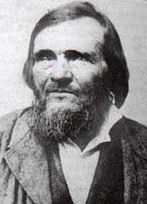Two-Seed-in-the-Spirit Predestinarian Baptists
The primary centers of Two-Seedism were in Northern Alabama, Arkansas, Eastern Tennessee, Florida, Georgia, Illinois, Indiana, and Texas.Parker was a strict predestinarian, but his chief objections in the booklet are based on ecclesiology - for example, "They have violated the right or government of the Church of Christ in forming themselves into a body and acting without of the union."Several important preachers on the east coast led in the "anti-missions" movement, but Elder Parker was the leader on the frontier, and probably spoke best to the common man.It seems that Parker spread his "two seeds" far and wide, and a goodly number of the "anti-missions" movement accepted his doctrine, though it never achieved anything near majority status.Daniel Parker's name is almost synonymous with "anti-missions", but he was one of the important frontier preachers in Texas, leading in the organization of about nine churches in the eastern part of the state.However, in southern Georgia, at least, according to historian John G. Crowley, one may still find Two-Seed doctrines expounded by Primitive Baptists "if one knows where to go and what to listen for.Central Kentucky's Elder Thomas P. Dudley, a member of a church of the Licking Creek Association, produced a work on "Two Souls" to supplement Parker's on the two seeds."[11] The 1906 Census of Religious Bodies, there were nineteen churches in Tennessee, ten in Arkansas, nine in Kentucky, five in Georgia, four in Indiana, three in Florida, two each in Alabama and Texas, and one in Missouri with a total membership of 781.The fourth congregation is the Concord Church in the Highland District near McMinnville, Tennessee, with ten members and an average attendance each Sunday from twelve to fifteen.[18] American novelist Kurt Vonnegut Jr. refers to the sect in his early novel God Bless You, Mr. Rosewater (1965), when the title character claims that he is a member.
BaptistsChristianityProtestantismPuritanismAnabaptismBaptist beliefsConfessionsBelievers' ChurchPriesthood of all believersIndividual soul libertySeparation of church and stateSola scripturaCongregationalismOrdinancesOfficesFreedom of religionList of BaptistsJohn SmythThomas HelwysThomas GranthamRoger WilliamsJohn ClarkeJohn BunyanShubal StearnsAndrew FullerCharles SpurgeonJames Robinson GravesWilliam Bullein JohnsonWilliam CareyLuther RiceJohn GillJames P BoyceBaptist denominationsBaptist World Alliance"anti-mission" BaptistsDuck River and Kindred BaptistsOld Regular BaptistsRegular BaptistsUnited BaptistsPrimitive BaptistsTwo-Seed doctrineNorth AmericaPhiladelphiaGreat AwakeningsSeparate BaptistsDaniel Parkersoteriologyecclesiologypredestinarian"bad seed"CalvinismMexicoProtestantElkhart, TexashereticalimmersionordinanceLord's Supperfoot washingJacksboro, TexasPutnam County, IndianaBryson, TexasLimestone County, AlabamaMcMinnville, TennesseeValdosta State UniversityThe American LanguageH. L. MenckenAmericannovelistKurt Vonnegut Jr.God Bless You, Mr. RosewaterWayback MachineClark, Elmer TalmadgeMencken, H.L.Encyclopedia AmericanaDenominationsBaptists in the United StatesAlliance of BaptistsAmerican Baptist AssociationAmerican Baptist Churches USAAssociation of Reformed Baptist Churches of AmericaBaptist Bible Fellowship InternationalBaptist General Association of VirginiaBaptist General Convention of TexasBaptist Missionary Association of AmericaCentral Baptist AssociationChristian Baptist Church of GodChurch of Christ, InstrumentalContinental Baptist ChurchesConvergeCooperative Baptist FellowshipDistrict of Columbia Baptist ConventionFellowship of Independent Reformed EvangelicalsFoundations Baptist Fellowship InternationalFree Will Baptist ChurchFull Gospel Baptist Church FellowshipFundamental Baptist Fellowship AssociationGeneral Association of BaptistsGeneral Association of General BaptistsGeneral Association of Regular Baptist ChurchesGeneral Six-Principle BaptistsIndependent BaptistIndependent Baptist Church of AmericaIndependent Baptist Fellowship InternationalIndependent Baptist Fellowship of North AmericaInstitutional Missionary Baptist Conference of AmericaLiberty Baptist FellowshipNational Association of Free Will BaptistsNational Baptist Convention of America, Inc.National Baptist Convention, USA, Inc.National Baptist Evangelical Life and Soul Saving Assembly of the U.S.A.National Missionary Baptist Convention of AmericaNational Primitive Baptist Convention of the U.S.A.New England Evangelical Baptist FellowshipNorth American Baptist ConferenceNorthern Baptist ConventionOld Time Missionary BaptistOriginal Free Will Baptist ConventionPentecostal Free Will Baptist ChurchPrimitive Baptist Conference of New Brunswick, Maine and Nova ScotiaPrimitive Baptist UniversalistProgressive National Baptist ConventionSeparate Baptists in ChristSilver Bluff Baptist ChurchSouthern Baptist ConventionSouthwide Baptist Fellowship